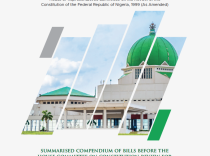The House of Representatives at its plenary session on Tuesday, October 3, 2017 mandated its Committee on Tertiary Education and Services to investigate the circumstances that led to the reduction in the cut-off marks required for admissions of candidates into tertiary institutions in Nigeria by the Registrar of the Joint Admissions and Matriculation Board (JAMB). The Committee was also given four (4) weeks to report its findings for further legislative action.
Moving the motion that was sequel to the House resolution, Hon. Hassan Saleh (PDP:Benue) recalled that the matter arose during the National Assembly’s annual recess in August . According to the lawmaker, Professor Ishaq Oloyede, Registrar of (JAMB) in a nationwide press briefings disclosed the decision to reduce cut-off marks for entry into tertiary institutions came after robust engagements with heads of tertiary institutions and stakeholders. The Registrar of JAMB, also went further to announce a minimum of 120 cut-off marks in the Unified Tertiary Matriculation Examination for placement of candidates into Universities, while 100 marks would be required for placement into Polytechnics or Colleges of Education in the 2017/2018 academic session.
Speaking further, Hon. Saleh expressed concern over the low “cut off” mark set in the light of statistics that show that 500,000 candidates scored over 200 marks, that is over half of the total examinations mark of 400 marks. He also highlighted that the 120 minimum “cut-off mark” was inappropriate as it required that students score a minimum of only 30% of the total examination marks or 25% of the total marks for entrance into Polytechnics and Colleges of Education.
Hon. Abubakar Chika Adamu (APC:Niger) also spoke on the likely implications of the decision warning that it was bound to lower the quality of education in tertiary institutions. He also warned that the lower marks required could lead to candidates who performed worse in the UTME examination securing admissions through nepotism, bribery and corruption while candidates who performed excellently and way above the minimum marks prescribed could ironically be denied admissions. In addition, Hon. Adamu stressed that Universities are supposed to be centres of excellence for learning, research and innovation that should be pre-disposed towards admitting the best candidates that could produce graduates capable of competing favorably with peers anywhere in the world.
Hon. Adamu also concluded his contributions on the motion by stressing that tertiary education should be for candidates who have intellectual capacity and advocated against the lowering of entry qualifications into higher institutions. He stated that failure to reverse this cut-off marks would reduce the productivity and peak performance of young people seeking admissions into higher institutions.





